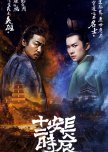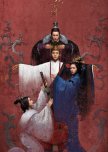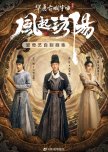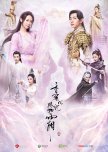 Wrap-Up: Top 2022 Dramas on MDL (by Country and Genre)
Wrap-Up: Top 2022 Dramas on MDL (by Country and Genre) Nous sommes en l'an 228 de notre ère et la Chine est divisée en trois royaumes en conflit. Une bataille apparemment décisive vient d'avoir lieu, l'armée de Shu affrontant celle de Wei. Mais les chefs militaires de l'État de Shu sont convaincus que l'issue de la bataille a été influencée par une campagne de désinformation - des informations erronées ayant conduit à une erreur de jugement critique. Ils pensent que tout cela a été orchestré par Chen Gong, un puissant espion qui se trouverait quelque part en territoire Wei. Les dirigeants de Shu répondent en envoyant leur propre espion, l'as du contre-espionnage Xun Xu. Mais lorsque Xun Xu retrouve Chen Gong, il apprend que la taupe pourrait en fait être un espion connu sous le nom de Dragon Bougie. Pire encore, le Dragon Bougie a élaboré une stratégie qui pourrait aider ses maîtres à mettre la main sur les plans d'une nouvelle arbalète puissante. Si l'ennemi s'empare de ces plans, son armée pourrait être équipée de ces armes puissantes, faisant basculer le cours de la guerre en sa faveur… une bonne fois pour toutes. Xun Xu et Chen Gong n'ont d'autre choix que d'unir leurs forces. Le duo d'espions doit agir rapidement, déchiffrer les codes et déjouer les pièges sans relâche s'il veut sauver son royaume de la ruine ! (Source : Viki) Modifier la traduction
- Français
- Deutsch
- Italiano
- Português (Brasil)
- Titre original: 风起陇西
- Aussi connu sous le nom de:
- Réalisateur: Lu Yang
- Scénariste: Jin Hai Shu
- Genres: Historique, Mystère, Crime, Guerre
Où regarder Feng Qi Long Xi
Distribution et équipes
- Chen KunChen GongRôle principal
- Johnny BaiXun XuRôle principal
- Nie YuanFeng Ying [Section Clerk of Siwencao, Shu State]Rôle Secondaire
- Yin Zhu ShengLi Yan [General of Shu State]Rôle Secondaire
- Chang YuanSun Ling [Scribe room, Shu State]Rôle Secondaire
- AngelababyLiu Ying [Musician of Ziyan House, Shu State]Rôle Secondaire
Critiques

Who will spy on the spies?
The Wind Blows from Longxi is an intricate ancient spy thriller that is not for instant gratification audiences. Its biggest hurdle are the first three or four episodes that are weighed down by the introduction of too many bearded and murky characters on both sides of the Shu-Wei conflict. Clearly even Lu Yang couldn't resist romance of the Three Kingdoms lore and goes down the rabbit hole of lingering on defining events and larger than life figures of the day that are peripheral to the otherwise tight plot. Past that, the storytelling simply immerses you in the lonely, tangled, nail biting, heartbreaking, cruel and utterly thankless world of ordinary spies, ants who put themselves in harms way to pave the way for great men to be glorified by history.Recent adaptations of Mo Boyang's works have been orgies of high speed chases and thrilling action scenes that fall short on suspense and in delivering satisfying and convincing motives and twists. This is very much the opposite. The production values are movie like in quality but due to the shadowy palette, this is best enjoyed on a big screen. The camera is often very still and at times comes at avant-garde angles in low light that accentuates the clandestine nature of the interactions, of opaque motives and conveys a omnipresent sense of alone-ness, tension, ambiguity and danger. The action scenes are signature Lu Yang - impressively choreographed, blood thirsty, vicious and up close and personal in the critical moments.
This drama is set during Zhuge Liang's Northern Expeditions, a period of stalemate between Shu and Wei where neither side had a clear advantage or scored decisive victories. It is an apt setting for this kind of story because when the margins are narrow, intelligence and counter intelligence can tip the scales in either direction. The drama opens with Zhuge Liang's first (of five) Northern Expeditions, which was unsuccessful. This led to General Ma Su's decapitation for his failure to hold Jieting and Zhuge Liang's demotion. It allowed his political rival General Li Yan who advocated a Southern campaign against Wu instead of Zhuge Liang's Northern Expeditions against Wei, to gain power and influence. The Northern Expeditions took place in rather complex geographic terrain, where the timely delivery of military food provisions was challenging and made the difference between victory and defeat. That is broadly most of the historical background that is needed to understand this story. Of course Three Kingdoms buffs will be thrilled by the "drive-by" of many legendary figures on both sides of the conflict but the important characters in Ma Boyong's stories are always the little people or the ants.
The lines between fact and fiction blur as Siwencao, Shu's intelligence agency, suspects that compromised military intelligence had led to their defeat at Jieting. Siwencao hastily concludes that Chen Gong (Chen Kun), a Shu spy code name Baidi (White Emperor) under deep cover at Tianshui (a Wei stronghold) must have defected and sends Xun Xu (Bai Yu), Deputy Chief of Internal Affairs to deal with him. But Xun Xu is not convinced of Chen Gong's culpability; they are intimate friends, related by marriage. Together, they discover that the highest echelons of Siwencao has been infiltrated by Zhulong (Wax Dragon), a Wei spy. They can trust no one and go rogue with a bold ploy to lure Zhulong out into the open with Shu's crossbow design, long coveted by Wei. They are forced down separate paths that are fraught with danger, under resourced and alone with nothing but their absolute trust in and knowledge of each other. But nothing ever goes completely to plan and everyone has secrets. When the rubber meets the road, will they still have each others' back? How well can one really know someone? This also applies to Chen Gong's relationships with both Mi Chong and Guo Gang, which are as riveting and illuminating has his relationship with Xun Xu. After all, this is about two states at war with each other, there is really no good or bad or right or wrong side. All of the characters on both sides are patriots to their own cause; fascinating, layered, suspicious and disingenuous characters practiced in the art of deception. Were it not for an accident of birth, Guo Gang could well have been a Xun Xu to Chen Gong.
The role of such a cunning, duplicitous and morally ambivalent character such as Chen Gong must have been written with Chen Kun in mind. He dominates the screen in every scene and had my heart in my throat at his ability to turn around dire situations and the glimpses of his ferocious, raw pain and rage that is quickly disguised by indifference or conviviality. The wildness and the violence of his emotions when he takes revenge, where his veins literally popped out of his forehead is frighteningly intense and breathtaking. Bai Yu's Xun Xu is Chen Gong's conscience, a sincere and persistent truth seeker whose bottom line is not flexible. Xun Xu's most consequential mis-calculations are with those he loves best and his regret and unspeakable guilt and sorrow are among the most moving performances I have seen from Bai Yu. While Chen Gong and Xun Xu don't actually get that much screen time together, their screen chemistry is tangible and conveys a bond that transcends dialogue with undercurrents from their body language and their unguarded manner with one another. When Chen Gong starts to play a lone hand, Xun Xu senses it and their dynamics shift and become subtly more stilted, again showcasing the sheer virtuosity of their performances.
The most outstanding aspect of Longxi's storytelling is how masterfully the narrative builds up to the plot twists and the reveals. It is so insidious that by the time the reveals happen it is already sitting on the edges of my mind and thus seems to be organic. This is very compelling because I feel that I am part of the process, and underneath all the surrounding complexity the solutions are rather straightforward and should have been obvious. The characters are so fully actualised that their decisions are characteristic and the outcomes are inexorable. Unlike many other conspiracy heavy plots, this does not succumb to too many twists with overly convoluted or illogical outcomes.
The ending is gut wrenching and yet oddly triumphant and fitting. What is clear from the get go is that Chen Gong and Xun Xu are just expendable pawns caught in a high stakes game where they are besieged by both the enemy within and the enemy outside. As a result of serendipity and his own deviousness, Chen Gong is able for a moment, to seize control of the chess board. He plays the White Emperor's gambit, trading one life for three, empowers a righteous man and writes his own ticket home. His decisions are completely in character and in doing so, he finally articulates his own bottom line. But I won't lie, my first reaction to the ending was ".And that is why those dumb f*cks lost the war!" Because I am not sure the greater good was served. While one traitor is felled, the other villain with equally dishonourable tactics gets off largely unscathed and Siwencao remains a weapon that can be both used and abused. The age old question - "Who will spy on the spies?" remains.
While the start is dense and lacks finesse and the dialogue is on the heavy side, this is a drama that rewards the patient viewer. It is not a masterpiece, indeed many of the criticisms about accessibility and the dialogue that is heavily littered with modern phrases are more than fair. Yet I find the immersive storytelling, the suspenseful plot, the stellar acting and the unconventional camerawork immensely enjoyable. This is not something likely to enjoy mass appeal but for me, I would be surprised if I watch a better drama in 2022. I can happily give this a 9.5/10.

Very niche, but my favourite show EVER!
"Two men talking in a room" is what you'll get in 60% of this show. 25% of the show has more than two but no more than ten men, or a man and a woman, talking in a room. And another 10% is two or more men talking outdoors... yup, you get the idea. Superficially, that's most of what you'll see in The Wind Blows From Longxi. And it’s also part of the show's very niche appeal.Longxi checks all my personal boxes for a favourite drama— great acting, real historical events, tight plot, treacherous politics, and zero distracting romance. It’s one of my favourite shows of all time, if not my favourite show ever. In a nutshell, Longxi is about spies during the Three Kingdoms period. Chen Gong is a veteran Shu field agent embedded in Wei. A critical military campaign against Wei goes horribly awry due to wrong intel provided by Chen Gong. How did that happen? Where do Chen Gong's loyalties truly lie? These are the questions that Chen Gong’s sworn brother and in-law, Xun Xu (also an intel veteran), is brought in to investigate. If you’ve read The Tao of Spycraft or any of Ralph Sawyer’s other books on ancient Chinese warfare, many of the spy methods and tactics in this show will be familiar. Since defection and double agents are normal in spycraft, one question is whether the defection is genuine or just a ruse to gain the enemy’s trust. That’s the central issue in this show, which the poster caption 谋中谋 计中计 (“the scheme within the scheme; the plan within the plan”) encapsulates.
Plot: A very twisty plot that doesn’t strain credibility. The least headache-inducing way to follow the plot of this show is to ask whose interests are currently aligned with whose. Without saying too much about what happens (because that would really ruin everything), the whole plot turns on the constantly shifting allegiances of various players, at the highest and lowest levels of society, in the conflict between Shu and Wei. The plot is complicated but doesn’t tie your brain in a knot until the episodes hit the late teens. Thankfully, ep. 21 onwards provide the clarification you need. If you get lost, there is a 5 minute “Cliff’s Notes” recap at the end of every episode that summarises the key developments. However, you’re very much on your own when it comes to the finer plot points, which the recap doesn’t cover. The final resolution is elegant and gut-wrenching, and I am glad the team did not go for a happier ending. That would have been far less satisfying.
Script: The script doesn't waste any time getting the show off the ground, even if it seems that little goes on in the first episode (it's important background context and sets the scene for everything else). Overall, it's just the right length at 24 episodes. Since this is a hardcore spy-plus-politics drama, most of the real action takes place behind closed doors, with bearded, middle-aged men plotting and scheming over cups of tea. The dialogue is exquisitely political and worth following closely. We are treated to scene after scene of various players abandoning old allegiances and cementing new ones, and having those allegiances tested by their new masters. One such scene is the one where Feng Ying (Shu spymaster) seeks out Li Yan (Shu general), formerly from an internal “enemy” faction, to declare his allegiance to Li Yan. Feng Ying tries to get on Li Yan’s good side to protect himself from Li Miao (Shu interim mid-level "civil servant"), who also works for Li Yan, but wants to turn Feng Ying into a scapegoat for his own political purposes. Li Yan appears to believe this is a ruse by Feng Ying and tests him, but goes along with it as it benefits him in the short term. I also liked how there were relatively few flashbacks. The ones in Longxi are short and moving without being too sentimental; I especially loved the one where a ball lying by the door causes a very miserable Guo Gang to reminisce about playing cuju (蹴鞠?) with Chen Gong in the rain. Another striking thing is the judicious use of action scenes. Since Longxi is about politics and intel, there are only a handful of brief action scenes (mostly military skirmishes). Then in ep 23, the viewer is treated to the show's only extended sword-fighting sequence with Chen Gong. The burst of pure violence and pent-up rage in this sequence arguably makes this scene the emotional climax of Longxi. Chen Gong, like any good field agent, has iron self-control. At worst, he has quiet breakdowns in private, then quickly gets his act together again. But in the swordfight scene, he lets it all out. It's moment of pure catharsis for the character that sets the stage for the final episode. Definitely one of the finest moments in an already amazing show.
Themes: The 2 main themes of Longxi are (1) the moral neutrality of politics, and (2) that human relationships are a double-edged sword. The life-and-death political struggle between Zhuge Liang and Li Yan is not a matter of good versus evil (even if Li Yan does some truly terrible things), but down to a difference in opinion as to how Shu should ensure its medium-term survival. And at the end, it’s Chen Gong’s feelings for Di Yue (his wife) and Xun Xu that threaten his allies’ best-laid plans, even as his allies exhort him to continue making enormous personal sacrifices for Shu. For both Xun Xu and Chen Gong, what ultimately gives them moral closure and defines their biggest decisions is not self-interest or patriotism, but staying true to their loved ones. Powerful stuff.
Acting: Everyone put in an A+ performance here, except Angelababy. I have nothing against that lady, but she was pretty wooden in this show and looked so airbrushed. She also didn't quite click with Bai Yu on screen. (I don’t watch enough shows to comment on whether this is better or worse than AB’s usual...) Chen Kun was of course brilliant as Chen Gong, but I was equally (if not more) impressed by Bai Yu’s low-key but completely spot-on performance as the dangerously sentimental Xun Xu. Xun Xu has the smarts and EQ to be a great intel guy, but he's too emotional and high-minded for his line of work. He's terrible at lying and makes a few wrong calls that have serious consequences. One gets the sense that he has only survived this long due his kicked puppy expression that tugs at everyone's heartstrings, a good brain, and sheer luck. Bai Yu perfectly captured this precarious balance of vulnerability, world-weariness and cunning at the core of Xun Xu. His final exchange with Chen Gong, especially the delivery of「我看透了你的心」(“I’ve seen through your heart”) in ep. 24 was also a total tear-jerker. With a lesser script and actor, Xun Xu would have been a character whose naivete makes the viewer question how his head has managed to remain on his shoulders. But through the combination of great script characterisation and Bai Yu's acting, Xun Xu becomes a convincing example of the idealistic survivor who manages to keep going even after all the dust has settled. I also really enjoyed Edward Zhang’s performance as the Wuxian cult leader Huang Yu. He fully conveyed his character’s megalomania and cruelty with what little screen-time he was given. The actors playing Feng Ying, Guo Gang and Mi Chong were also absolutely brilliant. I loved them all!
Music: This was okay. It was composed by Kawai Kenji, but I was hoping for thematic music that was less Western in flavour. It was also disappointingly run-of-the-mill "epic"-sounding stuff. But it's not a deal-breaker for me.
All in all, 10/10, A++++ from this very satisfied viewer! For me, I’m not sure if any other mainstream period drama can compare with this show.

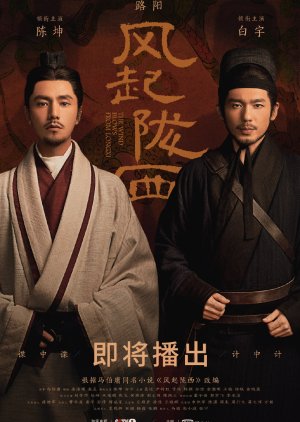











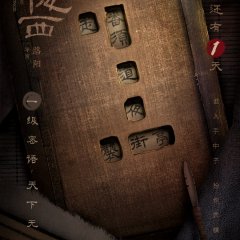
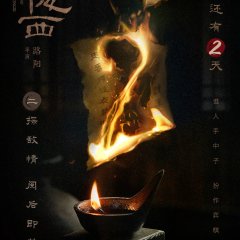
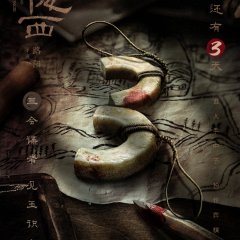
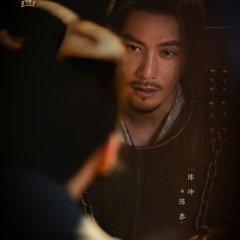
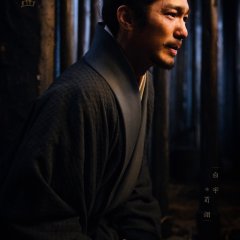
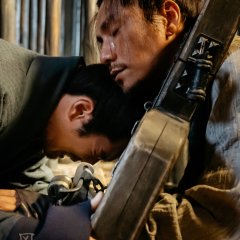
 1
1 1
1
